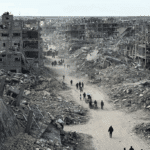Cairo/Brussels, 31 August 2015 – In a judgment delivered on Saturday by the Cairo Criminal Court, the Al Jazeera English journalists, Mohamed Fahmy, correspondent Peter Greste (in absentia) and producer Baher Mohamed, as well and three co-defendants, were found guilty for not being registered as journalists, publishing false news, and having operated from a Cairo hotel without a licence, among other charges. They have been sentenced to 3 years of prison, Baher Mohamed to 3 years and 6 months. Two defendants were acquitted. Having jointly observed the entire trial, the Egyptian Commission for Rights and Freedom (ECRF) and Avocats Sans Frontières (ASF) deplore this ruling which is a new defeat for freedom of expression in Egypt. Moreover, the organisations are highly concerned by the conditions under which the case was conducted and used as efforts to increase the control on the Press in Egypt.
This ruling is related to the arrest, on December 29, 2013, of several journalists and technicians who worked for a branch of the Qatari-owned Al-Jazeera Media Network, the Al-Jazeera English (AJE) channel. The journalists were prosecuted together with a group of individuals arrested on suspicion of belonging to a terrorist organization, referring to the Muslim Brotherhood. The group was later banned in Egypt and accused by the Egyptian authorities of being responsible of terrorist attacks in the country.
With a joint team of four observers, ASF and the ECRF have observed the entire re-trial (12 hearings since February 2015). The trial presented significant guarantees in the conduct of the proceedings, which demonstrated, to a certain extent, a willingness to guarantee the fairness of proceedings.
Both associations however express their concerns with regards to the way this case was built by the prosecution and treated by the Judiciary, from its very outset.
It was observed that some of the accusations on which the judicial proceedings were initiated, more specifically the ones related to the affiliation to a terrorist organization, have being neither debated during hearings nor backed up by factual evidence. This amounts to a breach of the fundamental rules of criminal proceedings.
As a direct consequence of the terrorist charges brought against the journalists, the case was brought in front of a specialized court. Moreover, the case hearing was held at a court room in the prison complex, totally controlled by the Interior Ministry and not a public judicial place hence limiting access to the public. In addition, the set up of the courtroom violated defendants’ fundamental human rights: the defendants were placed in a glass cage which impacted their defense.
This case is being perceived by the international community as emblematic of the treatment of journalists as suspected terrorists by the application of abusive judicial proceedings. “The case remains an example of how an issue on the freedom of the press can be considered and treated as a terrorist case, with grave and irreversible consequences for the journalists involved”, says Chantal van Cutsem, ASF Strategic Coordinator for the Middle East and North Africa.
Recognizing this, the ECRF and ASF call upon the Egyptian authorities to unconditionally respect the Egyptian Constitution, which guarantee the respect of press freedom and journalists.
They also urge the Egyptian authorities to reform the media legislation to be in line with international standards on the freedom of the press and other media and, in particular, to decriminalize the practice of journalism without being affiliated with the Journalists’ Syndicate.
The Egyptian authorities are also urged to review the conditions and procedures of international correspondent working in Egypt to insure that journalists are able to report freely, independently and without intimidation.
Download the full press release (pdf)
Picture: © Youtube/Al Jazeera English



